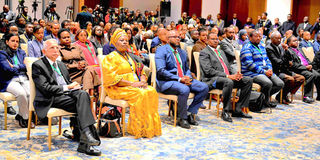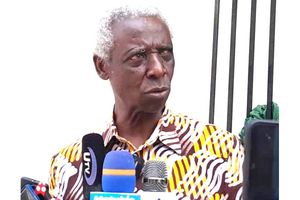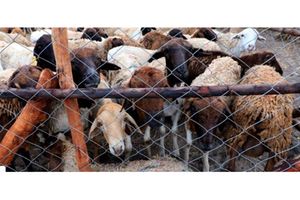Role of diaspora in Africa’s drive for democracy

Participants following the opening ceremony of a high-level forum on the state of democracy in Africa that ended in Arusha yesterday. PHOTO | FILE
What you need to know:
- Experts have also deliberated on various approaches that the African diaspora can take in leading the democratisation agenda in their countries
Arusha. One of the effective ways the African diaspora can contribute to the growth of democracy in their home countries is through promotion of free and independent press, experts meeting in Arusha have said.
The experts who have converged here for a week-long meeting on the state of African democracy said a free and independent press was a single major tool of holding leaders accountable.
“The diaspora can help in promoting free and independent press. Every thriving democracy will tell you that it is a result of a free press which easily holds politicians accountable.
“The free press can help in educating the public to demand for their rights and freedom,” said a UK-based lawyer, Mr Ernest Ambei.
University of Dar es Salaam (UDSM) lecturer, Dr Mbwana Amon said many important institutions like the mainstream media have lacked the capacity to hold governments accountable due to the lack of funding.
“Many Diaspora have access to money, if they can empower the media so that it is not dependent on the government entities, we can achieve this goal as Tanzania and Africa as a whole,” he said.
The experts from across the globe, mostly Africa, have gathered here for the high-level forum on the state of African democracy.
The meeting was convened by the Centre for Strategic Litigation (CSL), the Institute of Security Studies (ISS), and hosted by MS Training and the Centre for Development Cooperation.
One of the topics that were deeply discussed was “The Place and Role of the African Diaspora in Democratisation.”
The experts also deliberated on various approaches that the African diaspora can take in leading the democratisation agenda in their countries.
Empower democratic institutions
They said strengthening democratic institutions such as electoral commissions, the judiciary and the legislatures was another important way of strengthening democracy in Africa.
Some, however, believe not every diaspora can contribute to the growth of democracy in countries they ran away from and have no idea of the situation on the ground. The latest World Bank report shows at least 160 million people who were born on the African continent now live and work in other parts of the world, with their remittances reaching $95.6 billion in 2022.
The forum heard that the amount was significantly higher than what Africa receives in foreign aid.
“This is more than double what Western countries give to Africa as aid. It is almost equal to what comes in as foreign direct investment,” said Mr Ambei.
Leading the discussion, Mr Ambei suggested three ways the African diaspora can contribute to the strengthening of democracy in their countries.
He said the group can contribute through strengthening democratic institutions such as electoral commissions, the judiciary and the legislature.
"I have seen diaspora returning to countries like The Gambia, Sierra Leone and started training people in various institutions including Parliaments on how to hold the government to account and also trained electoral commissioners," he noted.
He said the diaspora can also help in reinforcing democratic processes by importing ideas from their adopted countries, especially in enlightening political parties how to shape ideologies and train them how to run effective campaigns.
Unfair treatment
Dr Amon further noted that most African countries had unfairly treated the diaspora, making many demotivated in contributing the development of their home countries.
"Tanzania has had tensions with the diaspora for many years, which made us receive a small amount of remittances compared to our neighbours, a situation that has to be rectified,” he told The Citizen.
However, the democracy and development expert cautioned that there must be a thorough vetting of the ‘diaspora group’. “Not every diaspora wishes their country well, others are being used," he said.
Ms Suzane Musambara from Zimbabwe said 50 percent of the population in the African continent was made up of women, part of which are also diaspora.
"Women who have secured employment abroad have become breadwinners back in their countries, especially in Zimbabwe. They can still be part of the drive for democracy if well engaged," she said. But another Zimbabwean, a lecturer at Walter Sisulu University in South Africa, Dr Medicine Magocha, argued that depending on the African diaspora to drive the democratisation agenda in the continent would derail achievement recorded so far.
"Most of today's African diaspora often struggle to get citizenship of their host countries, when will they come back to contribute to African democracy? Some left their country in pain, when they get positions they mostly focus on revenge.
"So we have to be careful what kind of diaspora we are engaging in this endeavour, he noted."
Dr Emiranus Cosmas from Makerere University in Uganda told The Citizen on the sidelines of the conference that African diaspora continues to play a vital role in shaping the continent’s social and political landscape.
He said such impact has been felt since the struggle against colonialism to the contemporary challenges of democratisation with recent developments in technology and the impact of globalisation having further amplified the power of the diaspora to influence events in their home countries.
According to him, the trend in response by African governments has ranged from exclusion and isolation to cooperation and collaboration.
However, “Many African governments have been open to engagement with diaspora to facilitate financial investments, but have been more cautious in allowing political participation by the diaspora.
"Without making the diaspora feel part of their nation, we will not be able to make them bring new ways of governance as well as take the driving seat in the democracy agenda in their countries and continent," he noted.




